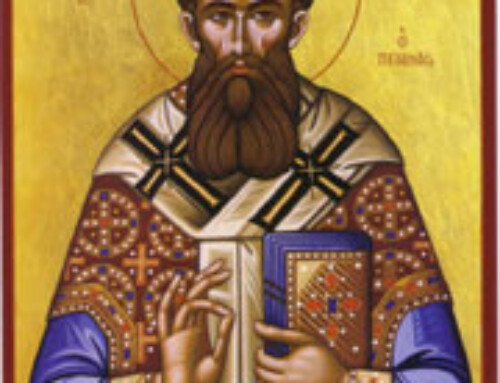Word Magazine January 2001 Page 13
WE SHOULD KNOW BETTER
By Very Rev. Jason DelVitto
After celebrating the festal season of the Nativity of Our Lord and Theophany, through which we rejoice in the incarnation of the Word of God and the revelation of the Holy Trinity, our focus in life is redirected once again to the person of Jesus Christ. If one were to contemplate the traditional festal icons of the Nativity and Theophany, one is struck by the centrality of the figure of Christ in both of these icons; Christ is at the center of all reality and all reality finds its ultimate goal and meaning in him. Our focus is brought to the “who” in life, not necessarily the “what.”
The philosophical and economic trends at work within our society have helped to shape our world view. Contemporary American society has, I believe, a tendency to encourage individuals to lead their lives and relate to their environment in a manner that tends to focus on the “whats” in life. Our desire for measurable and quantifiable “things” which we can create, possess and manipulate, seems to be the life theme of the day. We become overly concerned with the “how much” and “how manys” in life, sometimes at the expense of the “who.” We simply become obsessed with numbers and quantities. Even within our parish communities, we have a tendency to want to know how many people were present or absent for a service, perhaps not giving a thought to who was present and who was absent. In the morass of materialism, the dynamic of relationship among humans becomes skewed or even lost. Through the countless advertisements to which we are exposed every day, the message being sent is that we can’t live without those things that are being advertised. Indeed, we are led to believe that our very identity and worth as human beings is determined by and contingent upon our material possessions. These possessions are seen as the measure of our success in life; life would somehow seem lacking without them. The onslaught of the need for material possessions can affect the very way in which we relate to our environment and each other. How often it is that our children are, through advertising, led to believe that their self-worth is determined by the things they possess in life? This theme is nothing new to humanity, nor is it uniquely an American phenomenon, although it seems to be accentuated within our culture.
As Orthodox Christians, we are to know better. We know, through our own experience, that what essentially matters in life are not things, but the persons whom God has given to us so that we may love and cherish them. Material possessions, in and of themselves, are neither good nor evil. What matters is our will and our inclinations and relationships with those things we possess. Our identity and worth as humans is rooted in the very life of God and nourished within our families and parish communities. We are created by God as relational beings, in relationship with God and each other, and this is the theme that is to serve as the foundation for the Orthodox Christian family. Our treasure in life lies in God and in the bond of love that we have with each other.
Excessive materialism, which is so predominant in our society, is a theme with which we are no doubt familiar and we may even be tired of hearing commentaries about it, especially from the pulpit. Yet this excessive materialism, and the intense desires that go with it, lies at the heart of many of our spiritual ills. It seems that the more we possess, the more we want, and we may eventually find ourselves in the never-ending cycle of desire which can never be satisfied. We are beings of desire and that desire is manifested in each one of us as a hungering and thirsting for relationship with God and each other.
Orthodox Christian parents have the responsibility of modeling behaviors, setting standards and communicating values to the children entrusted to them. The ways in which parents relate to possessions in this world are observed by children and usually those behaviors and attitudes are appropriated by the children themselves. One of the greatest gifts that we can offer our children is the invitation to receive the greatest gift of God, his Son Jesus Christ. Our children will be invited to learn, through experience, that our relationships which we nurture in this life are personal relationships, and that there exists no object or thing in this world that can serve as a substitute for the relationship brought to us by and through the God-Man, our Savior Jesus Christ.

